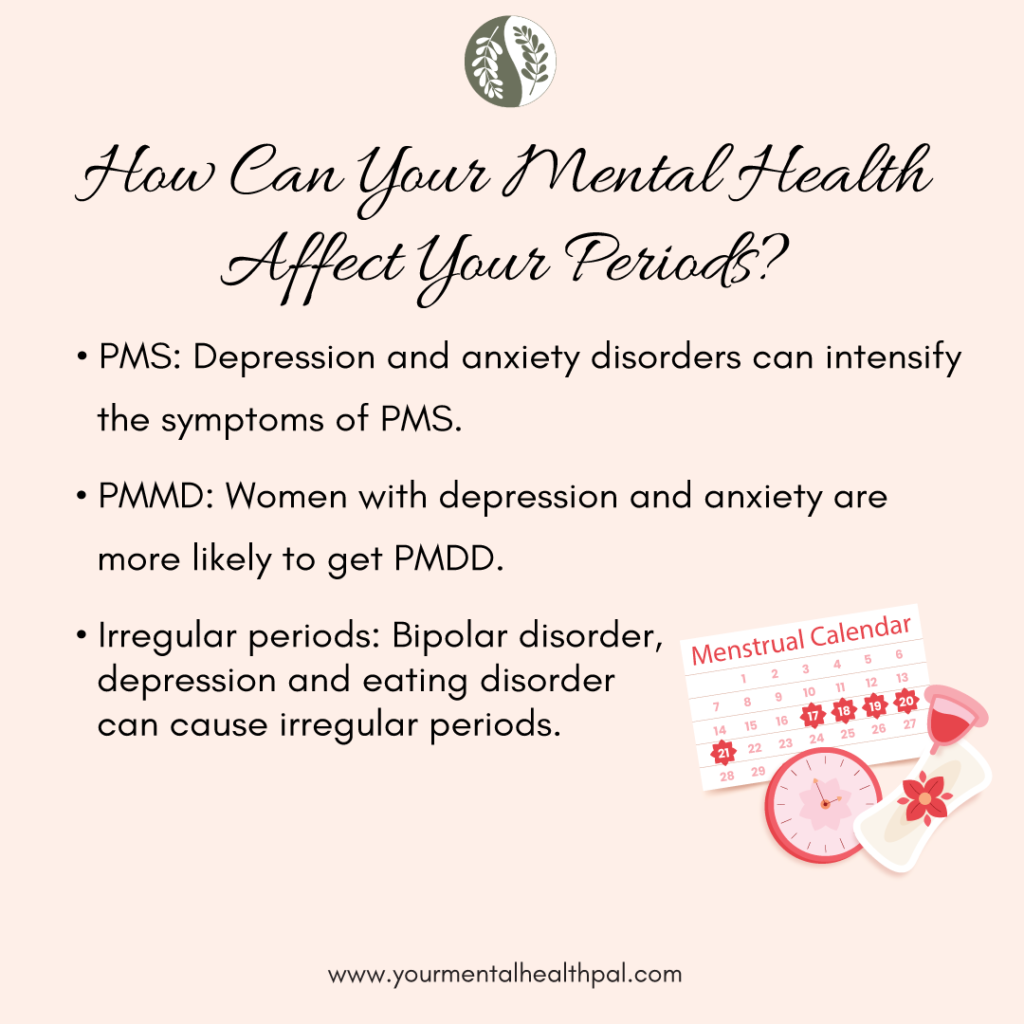Every month women experience a series of hormonal changes causing them to have an emotional breakdown during period. Women go through an emotional roller coaster, behavioral changes, and physical pain like cramps, muscle aches, fatigue, and nausea. This roller coaster begins with PMS when the body increases its hormonal activity to start the process. This blog post will discuss the relationship between PMS and women’s mental health.

Read why women have an emotional breakdown during period
What is PMS?
Premenstrual syndrome (PMS) is when various hormonal changes occur in women, usually happening in the time between ovulation and a period. PMS can have multiple symptoms ranging from mood swings to immense cramps to food cravings.
The symptoms of PMS usually occur in three forms:
Emotional symptoms:
- Crying spells
- Anxiety
- Mood swings
- Irritability
- low spirits
Behavioral symptoms:
- Appetite changes
- Food cravings
- Need for social escape
- Change in libido
- Insomnia
Physical symptoms:
- Acne
- Lower back pain
- Cramps
- Diarrhea or constipated
- Fatigue
- Headache
What causes PMS?
Are you wondering why females get angry during their period? Well, there’s a good scientific reason behind it. Every month women’s bodies raise the production of Estrogen and Progesterone to support the inner lining of the uterus. Still, the same hormones estrogen and progesterone escape through the blood vessels and spread across the body, including the brain.
These hormones interfere with the other chemical messengers inside the brain, i.e., neurotransmitters causing PMS in women. The amygdala is the brain responsible for emotions and tends to increase its activities in which the feel-good chemical serotonin decreases and chemicals causing stress and anxiety run high.
How are PMS and mental health related?
PMS and mental health are interlinked, as we just went through how the monthly changes in hormones can cause changes in women’s emotions and behavior. But in some rare cases, the difference in hormones and chemicals is so dynamic that it can result in causing Premenstrual Dysphoric Disorder.
Can your period affect your mental health?
As discussed above, periods can sometimes affect your mental health adversely in the form of PMDD (premenstrual dysphoric disorder). It is a more severe form of PMS in emotional aspects that can lead to anxiety and, in extreme cases, depression and suicidal thoughts, which is why the American Psychology Association has declared PMMD as a mental disorder.
How can your mental health affect your period?
Levels of some hormones rise and fall throughout your monthly menstrual cycle. The amounts of these hormones can impact how you think and feel both emotionally and physically. Mental health issues can cause or worsen menstrual irregularities.
Premenstrual syndrome (PMS):
Most women have PMS symptoms in the week or two leading up to their period. PMS symptoms include bloating, headaches, and moodiness.
Women with depression or anxiety problems may have worsening PMS symptoms.
Many women who seek PMS treatment also experience depression or anxiety. These mental health conditions have similar symptoms to PMS and might get worse before or during your period.
Premenstrual dysphoric disorder (PMDD):
PMDD is a disorder similar to PMS but has more severe symptoms, such as sadness, irritability, and stress. PMDD symptoms can be so challenging to control that they can cause significant disruptions in your everyday life.
Women with anxiety or depression are more prone to get PMDD. If you’re having trouble with depression or anxiety around your period, talk to your doctor about how to get treatment.
Irregular periods
Women with anxiety disorders or drug abuse disorders had shorter menstrual periods, according to studies (shorter than 24 days). Eating disorders and depression have both been connected to irregular cycles. Bipolar illness patients are also twice as likely to have irregular periods.
The solution to gain relief:
Period, PMS, and hormonal changes are a natural part of a woman’s life. However, emotional breakdown during the period can be relieved to some extent.
- Improving or changing your diet can help the effects of periods and PMS. For example, limit the consumption of carbohydrates, sugar, caffeine, and salt during your PMS and periods. And replace them with fruits and green vegetables.
- Perform exercises and yoga to help with your emotions and general health. Yoga will surely help you cope with feelings of depression.
Conclusion:
As it turns out, mental health and emotional changes during periods are interrelated. The high rise of hormonal activity causes fluctuations in emotions and behavior every month. But at the same time, ill mental health like depression or extreme stress can even worsen the symptoms of PMS and emotional changes during periods.
But the proper diet and yoga can help you with your PMS and mental health. Keeping your mental health in check is vital since it can affect your periods, pregnancy, and general health.
We understand the importance of mental health just as well as physical health, and thus, we try to spread awareness and diminish the stigma related to it.
We support and normalize mental health issues by posting two blog posts on Your Mental Health Pal every day, six days a week.
Feel free to share your emotional roller coaster experience on your periods or PMS in the comments below

